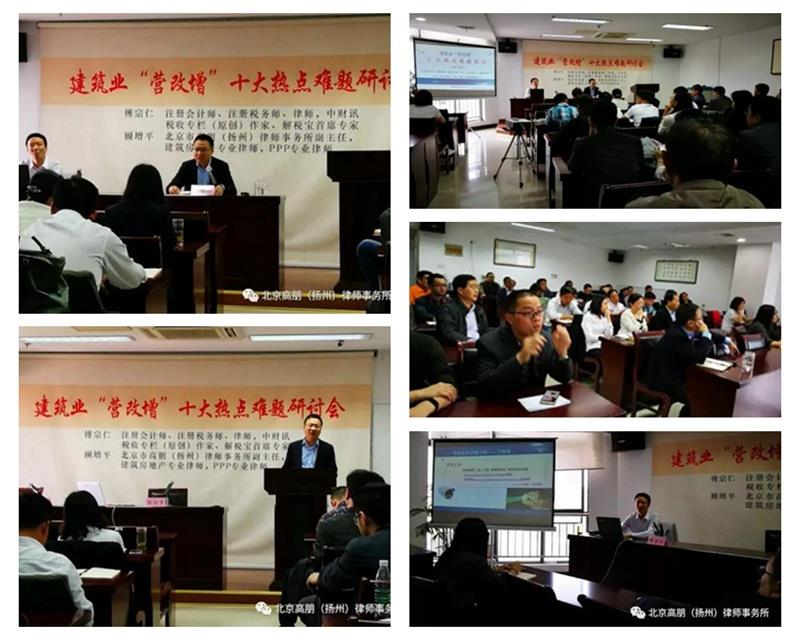Seminar on Ten Hot Issues and Difficulties of "Replacing Business Tax with VAT" in the Construction Industry Successfully Held at Gaopeng Lecture Hall
On the afternoon of May 5, 2017, the "Ten Hot Issues and Difficulties Seminar on" Replacing Business Tax with Value-Added Tax "in the Construction Industry" was successfully held at Gaopeng Lecture Hall, with over 50 participants from relevant principals of construction enterprises, lawyers, and the construction real estate legal team of Gaopeng Yangzhou Institute.
At the seminar, Mr. Zong Ren, a columnist (original) writer, chief expert of Jieshuibao, certified public accountant, and certified tax master of Zhongcaixun, first gave a special presentation on "Ten Hot Issues and Difficulties in the Construction Industry of Replacing Business Tax with Value-Added Tax". Mr. Fu Zongren comprehensively analyzed the impact of replacing business tax with value-added tax on construction enterprises from three aspects: forward-looking analysis of the tax situation, discussion of the top ten hot issues, and the latest tax policy interpretation, Since the year of replacing business tax with value-added tax (VAT), construction enterprises have encountered issues such as how to define whether to choose simple tax calculation for general contracting projects, whether the head office and branch offices should conduct unified accounting or separate accounting, the issue of using housing to offset project taxes, how project managers can legally take profits, and the relevant content of the 2017 New Policy on Replacing Business Tax with VAT issued by the State Administration of Taxation.
In response to the frequent outbreak of cases involving the falsification of special VAT invoices and ordinary invoices in the past year since the reform of business tax to VAT, Gu Zengping, Deputy Director of Beijing Gaopeng (Yangzhou) Law Firm, a professional lawyer in construction and real estate, and a professional lawyer in PPP, respectively described the definition of falsification of special VAT invoices and ordinary invoices, including the falsification of special VAT invoices The possible administrative penalties and criminal responsibilities for falsely issuing ordinary invoices, and how construction enterprises regulate fiscal and tax management to prevent the risk of illegal acts such as falsely issuing invoices.
This article is translated by software translator for reference only.

Related recommendations
- Gaopeng Law Firm and Hong Kong Chen and Li Law Firm have reached a strategic cooperation, embarking on a new journey of cross-border legal services
- Lawyer Chen Wenying and Wu Ailing were invited by the Law School of the University of International Business and Economics to teach practical skills in civil and commercial dispute negotiation
- Beijing Gaopeng (Qingdao) Law Firm's Shengqi and "Law Protection Tomorrow" Public Welfare Brand Unveiling Ceremony Successfully Held
- Lawyer Jia Mengmeng was invited to participate in the 9th "Taxation Judicial Theory and Practice" Forum


